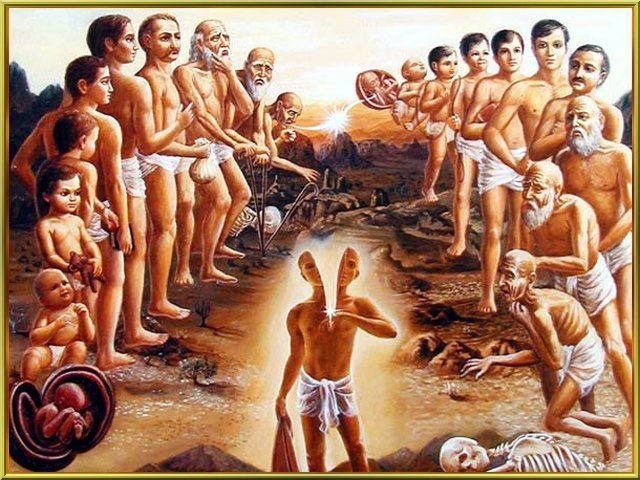Verse 26
atha cainaṁ nitya-jātaṁ nityaṁ vā manyase mṛtam
tathāpi tvaṁ mahā-bāho naivaṁ śocitum arhasi
(Word-by-Word Meaning):
- atha — even if
- ca — and
- enam — this (soul or being)
- nitya-jātam — born again and again, perpetually born
- nityam vā manyase mṛtam — or constantly dying, always subject to death
- tathā api — even then / despite that
- tvaṁ — you
- mahābāho — O mighty-armed (Arjuna)
- na evaṁ śocitum arhasi — you should not grieve in this way
But even if you think of the soul as constantly being born or constantly dying, O mighty-armed (Arjuna), even then you should not grieve.

Expanded Commentary:
In this verse, Lord Krishna addresses a hypothetical scenario. He says:
“Even if you do not accept the soul as eternal, as I have described earlier, but instead believe it to be repeatedly born and dying — even then, grief is unjustified.”
Two Perspectives:
- Vedantic View (Soul is eternal) – already explained in previous verses.
- Materialistic View (Soul is not eternal) – people are born and die again and again.
Even according to materialist philosophy (like Charvaka) or those who believe life ends with death, there is no point in lamenting something that is inevitable and natural.
Krishna’s logic is irrefutable: No wise person grieves over the unavoidable.
Philosophical Insight:
- Whether you are spiritual (soul is eternal) or rationalist (soul dies), mourning is irrational.
- Birth and death are natural processes — universal and cyclical.
- Attachment and sorrow stem from ignorance of truth and egoic identity.
Symbolic Meaning:
| Term | Symbolizes |
|---|---|
| Nitya-jātam | The endless cycle of rebirth (Samsāra) |
| Nityam mṛtam | The mortalist’s view – life ends with death |
| Mahābāho (Mighty-armed) | Arjuna’s inner strength to fight ignorance and delusion |
Practical Application:
- Let go of fear of death — it is a natural, universal law.
- Even in the face of loss, we can act with understanding rather than despair.
- A true warrior — in life or battle — must have clarity, not confusion.
Reflection Questions:
Do I cling to the idea that death is the end?
How do I emotionally respond to loss or separation?
Can I cultivate peace regardless of whether I believe in rebirth or not?
Conclusion:
Lord Krishna, in His divine compassion, meets Arjuna at any level of belief—spiritual or material. Even if one does not accept the soul’s immortality, mourning over death is still unwarranted, because death is inevitable and natural. Krishna’s teaching gently nudges Arjuna toward inner steadiness and wisdom beyond dogma or belief.
